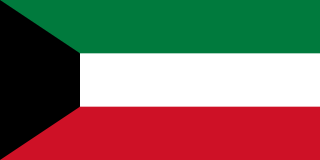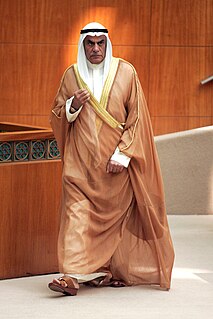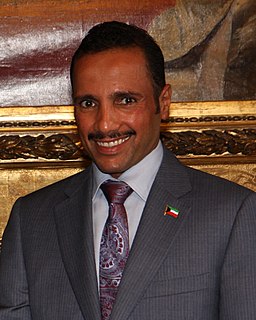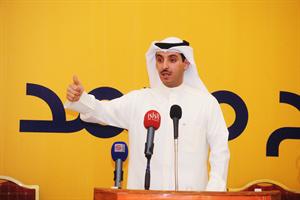Related Research Articles

Kuwait is an emirate. The political system consists of an appointed judiciary, appointed government, and nominally elected parliament.

The emir of the State of Kuwait is the monarch, head of state and head of government of Kuwait, the country's most powerful office. The emirs of Kuwait are members of the Al Sabah dynasty.

The National Assembly is the unicameral legislature of Kuwait. The National Assembly meets in Kuwait City. Political parties are illegal in Kuwait, candidates run as independents. The National Assembly is made up of 50 elected members and 16 appointed government ministers.

Elections in Kuwait are held for both the National Assembly and for the Municipality. Kuwait's constitution calls for elections to the unicameral National Assembly at a maximum interval of four years. Elections are held earlier if the Constitutional Court or Emir dissolve the parliament.

General elections were held in Kuwait on 29 June 2006. They were the first elections in Kuwait in which women were able to vote and run for office.

Kuwait, officially the State of Kuwait, is a country in Western Asia. It is situated in the northern edge of Eastern Arabia at the tip of the Persian Gulf, bordering Iraq to the north and Saudi Arabia to the south. Kuwait also shares maritime borders with Iran. Kuwait has a coastal length of approximately 500 km (311 mi). Most of the country's population reside in the urban agglomeration of the capital city Kuwait City. As of 2021, Kuwait has a population of 4.67 million people of which 1.45 million are Kuwaiti citizens while the remaining 3.2 million are foreign nationals from over 100 countries.

Ahmed Abdulaziz al-Sadoun was the Speaker of the Kuwaiti National Assembly from February 2012 until it was declared that the February 2012 elections were invalid. He was previously the speaker from 1985 to 1999. He is the leader of the Popular Action Bloc in the Assembly and served for eight terms.

The Constitution of Kuwait was created by the Constitutional Assembly in 1961–1962 and signed into law on 11 November 1962 by the Emir, the Commander of the Military of Kuwait Sheikh Abdullah III Al-Salim Al-Sabah.

Kuwait is an emirate with an autocratic political system. The political system consists of an appointed judiciary, appointed government, and nominally elected parliament.

Marzouq Ali Mohammed Al-Ghanim is the current speaker of the Kuwaiti National Assembly, representing the second district. Al-Ghanim earned a BSc in mechanical engineering from Seattle University and worked for Boubyan Petrochemical Company before being elected to the National Assembly in 2006. He is the son of Ali Mohammed Thunayan Al-Ghanim and Faiza Al-Kharafi. He was elected as the Speaker in 2013.

Musallam Al-Barrak is a Kuwaiti politician. He was a member of the Kuwaiti National Assembly, representing the fourth district.

Saleh Mohammad Al-Mulla was elected two times to the National Assembly of Kuwait in 2008 and 2009 after snap elections, representing the third district, and generally affiliates with the liberal deputies. Born in 1971, Al-Mulla studied Business at Kuwait University and received a M.A in Political Science from Harvard University and he was previously a diplomat representing Kuwait in the ministry of foreign affairs. He has two sons, Mohammad Saleh AlMulla and Khaled Saleh AlMulla. Saleh AlMulla was the youngest head of parliament of Kuwait at the time of his appointment. In 2015, he was arrested and accused of insulting the Emir of Kuwait and President of Egypt on his Twitter. However, he was acquitted from these charges.
Mohammed Jassem Al-Sager is a journalist, businessman, and politician.
Migrant workers in Kuwait constitute a significant proportion of the population.

National Association for Change(Arabic: الجمعية الوطنية للتغيير) is a loose grouping of the various Egyptian of all political affiliations and religion, men and women, including representatives of civil society and young people aims to change Egypt. There was general agreement on the need to unite all the voices calling for change within a National Assembly. Mohamed ElBaradei is in-charge of the National Association for Change. The movement aims for general reforms in the political scene and achieving some of those procedures and guarantees necessitates the amendment of articles 76, 77, and 88 of the constitution as soon as possible. Worth mentioning is that the banned political group the Muslim Brotherhood were represented by one of their key figures who attended the meeting however their stand in accepting a non-member of their group as a candidate is yet unclear. It is also unknown whether Amr Moussa the head of the Arab League who met with Elbaradei a day earlier will be part of the new movement. The goal of the group is to bring about political reform based on democracy and social justice.

The relations between Iraq and Kuwait are longstanding and complex, experiencing many changes throughout recent decades.

Early general elections were held in Kuwait on 26 November 2016. They follow the dissolution of the parliament elected in 2013 by Emir Sabah Al-Ahmad Al-Jaber Al-Sabah in October 2016. Under the constitution, elections must be held within two months. Opposition candidates won 24 of the 50 seats in the National Assembly. Voter turnout was around 70 percent.

General elections were held in Kuwait on 5 December 2020. Two-thirds of the incumbents lost their seats, including the 2016 parliament's sole woman MP Safa Al Hashem.

The Crown Prince of the State of Kuwait is the heir apparent to the Emir of Kuwait. Under Article 4 of the Constitution of Kuwait, this position can only be held by the descendants of Sheikh Mubarak Al-Sabah, and must be designated within a year of the Emir's accession. This designation is given effect by a combination of the Emir's nomination, and its approval by the National Assembly, as signified by a majority vote of its members in a special sitting. If this does not happen, the Constitution requires the Emir to nominate three descendants of Sheikh Mubarak Al-Sabah, of whom the National Assembly will pledge allegiance to one as the Crown Prince or heir apparent. To be appointed, the nominee must also have attained the age of majority, be of sound mind, and be the legitimate son of Muslim parents.